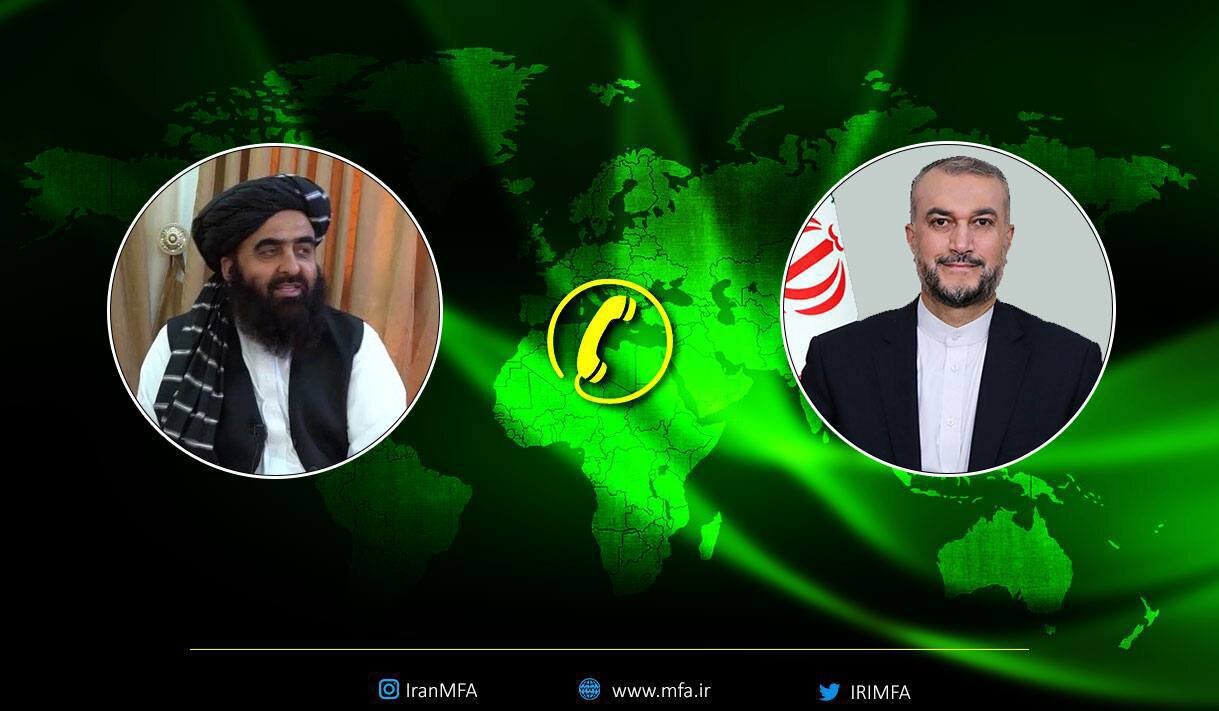Abdollahian talks to Taliban FM, demands Iran’s right from Helmand water

TEHRAN- Iran’s request to protect its water rights in the Helmand River and its sources in neighboring Afghanistan has been reiterated by Foreign Minister Hossein Amir Abdollahian.
Amir Abdollahian made the statement in a phone call on Saturday with Amir Khan Mottaqi, the Foreign Minister of the Taliban-run government.
For the first time by a group of Iranian experts recently visited the Helmand River.
According to the Iranian minister, the visits were made in conformity with the 1973 water-sharing agreement and would help to increase transparency in the water dispute.
The Hindu Kush Mountains, west of Kabul, are the source of the Helmand River, the longest river in Afghanistan.
The Helmand River flows in an arc southwest until it empties into the Hamoun wetlands, which are in Iran’s Sistan-Baluchestan Province.
Iran and Afghanistan signed a contract in 1973 to develop a way of controlling each country’s usage of the river after more than a century of conflict over Helmand’s water supply.
Based on the agreement, Iran should get an annual share of 820 million cubic meters from Helmand.
However, Afghanistan has flagrantly broken both the words and the spirit of the agreement, risking the lives of numerous Iranians who depend on the Hamoun wetlands for drinking water, farming, and fishing.
The river in Afghanistan has also been dammed, which limits the flow of water into Iran.
Iranian politicians and government representatives have often protested that Iran does not get its fair share of water from the river.
Taliban ministers attribute Iran’s recent water shortage on drought and technological difficulties.
Mottaqi was also informed by Amir Abdollahian that Iran has always sought prosperity and welfare for Afghan citizens, stressing that the Islamic Republic has accepted a sizable number of Afghan refugees.
Iran’s chief diplomat also renewed Tehran’s call for an inclusive government in Afghanistan.
“Tehran emphasizes the importance of cooperation among all parties inside Afghanistan with the purpose of promoting stability, security and welfare of the Afghan people,” the Iranian foreign minister said.
For his part, Mottaqi said that the brotherly ties between Tehran and Kabul are built on good neighborliness.
He also stated that attempts are being made to resolve the current issues between the two parties and extended an invitation to the Iranian foreign minister to travel to Kabul.
Back in June, Taliban agreed to let Iranian specialists assess the quantity of water behind the Kajaki dam in Afghanistan’s Helmand Province, according to Iran’s special envoy for Afghanistan Hassan Kazemi Qomi.
Kazemi Qomi stated during a televised interview that Iran is making significant efforts to defend its rights to a portion of water from the Helmand River.
President Ebrahim Raisi issued a warning to the Taliban leaders in May that they would be held accountable if they failed to deliver Iran with its fair share of water from the river.
“There would be no discussion if Iranian specialists certify that the dam in Afghanistan is dry, but if there is water, Iran will not tolerate any violation of its citizens’ rights,” the president said.
Iran FM speaks with Qatari and Omani counterparts
In phone calls on Saturday, Amir Abdollahian also addressed the extension of bilateral ties as well as regional and global events with his Qatari and Omani counterparts.
Iran’s top diplomat emphasized the cordial relations between Tehran and Doha with Qatar’s Foreign Minister Sheikh Mohammed bin Abdulrahman bin Jassim Al Thani, calling for the growth of bilateral ties.
Amir Abdollahian also praised the government of Qatar for its beneficial contribution to the process of freeing Iran’s frozen assets and for its senior officials’ positive contributions to regional and global developments.
On August 10, Iran said that it had been successful in securing the release of more than $10 billion of funds that had been unjustly frozen in South Korea and Iraq for a number of years due to U.S. sanctions.
The Qatari foreign minister, who also serves as prime minister, praised the friendly relations between the governments of Iran and Qatar, emphasizing the need to expand Tehran-Doha relations.
Amir Abdollahian and his Omani counterpart Sayyid Badr Albusaidi also discussed bilateral, regional, and international topics of mutual concern.
The Iranian foreign minister stated that Tehran is ready to conclude the terms of the two nations’ comprehensive cooperation deal.
He also complimented the Sultan of Oman, Haitham bin Tariq Al Said, for his positive efforts, and discussed the latest developments in Iran’s sanctions relief discussions with his Omani counterpart.
Albusaidi, for his part, made it clear that Oman is willing to enhance bilateral relations and regional collaboration with Iran.
He went on to say that Oman is eager to continue playing a constructive role in matters of mutual concern.
Leave a Comment